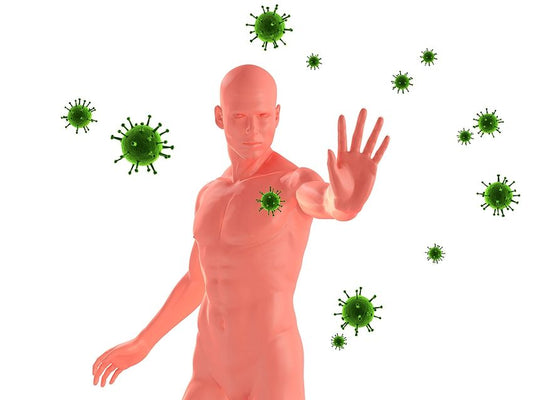When we hear about the immune and endocrine systems, we typically think of them as independently acting body systems.
But recently, scientists have been discovering more and more about the interactions between the two. Both systems are believed to work together to regulate bodily functions and keep infections at bay, but their relationship is fairly complex. So how do they do this?
In this article, we will explain a few mechanisms of how the endocrine and immune systems work together. But first, let’s take a look at each system's individual functions.
An Introduction To The Immune System
The immune system exists to protect our body’s against infection from harmful pathogens like bacteria, viruses, and parasites, which can cause illness and disease. Simply put, the immune system is crucial for our survival and keeps us healthy.
Many different cells, organs, proteins, and tissues make up the immune system, all working together to create a strong defense. These include white blood cells, also known as leukocytes.
White blood cells act similarly to bodyguards, patrolling the body on the lookout for invading pathogens as they circulate in the blood and lymphatic vessels.
When an intruder is detected, they multiply and send signals to recruit other immune cells, and the immune response is launched.
There are two main types of white blood cells:
Phagocytes: these are the killer cells. They prevent infections by surrounding and absorbing pathogens, very much like they are eating them!Lymphocytes: these store information to help the body remember previous pathogens. This means next time you encounter them, the body is already armed to attack them again and fights them off quicker. This is called immunity.The immune system is complex and can go wrong, with serious implications for our health. Types of immune disorders include:
- Immunodeficiencies: these arise when parts of the immune system do not work properly, such as white blood cells. This makes us more susceptible to other illnesses and diseases. Things like age, obesity, malnutrition, and alcohol abuse can increase our risk for immunodeficiencies.
- Autoimmune disorders: most of the time, our immune system can distinguish between our own cells and foreign cells. However, sometimes the immune system malfunctions and mistakes our own healthy body cells for foreign cells and starts attacking them. This can lead to autoimmune diseases such as rheumatoid arthritis and type 1 diabetes.
- Hypersensitivity: this is when the immune system overreacts to things like allergens and causes unnecessary inflammation. Anaphylactic shock is often an extreme reaction to an allergen and can be life-threatening.
An Introduction To The Endocrine system
The endocrine system comprises glands that produce chemical messengers called hormones. These travel in the bloodstream to deliver information and instructions to other cells and organs throughout the body.
There are hundreds of different hormones, each with its own job. They regulate things like mood, growth and development, sleep, appetite, stress, metabolism, and reproduction. In short, hormones impact almost every aspect of our daily lives!
The endocrine system ensures that our bodies maintain the delicate balance, known as homeostasis, required for our health and survival. When hormones or glands don’t behave as they should, endocrine disorders arise, disrupting this balance.
For example, diabetes is caused when the hormone insulin loses its ability to effectively control blood sugar levels. When these get too high, it can be life-threatening.
Normally, cells in the pancreas would detect high blood sugar levels and release insulin in response. Insulin moves glucose out of your blood and stores it in your cells for when energy is required.
How The Immune and Endocrine Systems Work Together
The immune and endocrine systems were once believed to work independently from each other, but recent research has shown they are tightly interwoven 1.
One way they are linked is through blood glucose homeostasis. As mentioned earlier, the endocrine system is normally in control of this balance. But when an infection occurs, the immune system steps in too.
This is because immune cells are highly dependent on glucose for their metabolism, so during an immune response, glucose consumption significantly increases 2.
The immune and endocrine systems work together to ensure this high demand for glucose is met so that the immune system can effectively fight off an infection.
In response to pathogens, immune cells called cytokines induce insulin resistance, reducing the body’s ability to store blood glucose. The purpose of this is to increase glucose availability to immune cells to increase the body’s ability to fight infection 3.
The two systems also interact through hormones released from adipose (fat) tissue which communicate to the rest of the body the status of nutrient stock within fat cells.
For example, during starvation, fat cells secrete a hormone called adiponectin to signal to the body to slow metabolic activity to increase energy efficiency. When nutrient-rich fat cells are abundant, they secrete a hormone called leptin, suppressing our appetite.
Both adiponectin and leptin are also involved in controlling the immune system 4. Adiponectin inhibits the action of inflammatory cells involved in the immune response, as well as the responsiveness and function of phagocytes. According to research, low adiponectin levels are linked to obesity, diabetes, and vascular diseases 5.
In contrast, leptin is associated with increased activity of the immune system. High levels of leptin are strongly associated with inflammation and an increased risk for autoimmune diseases, such as obesity 6.
Keeping Both Systems Healthy
For your immune and endocrine systems to function at optimal rates, it’s important to ensure you provide your body with all the right nutrients.
Taking a multivitamin like Performance Lab NutriGenesis Multi delivers all the essential daily vitamins and minerals your body needs for peak immune and endocrine performance, calibrated for the specific nutritional needs of men and women.
Combine this multivitamin with Performance Lab PL-Immune for an added immune boost!

Conclusion
The immune system is made up of immune cells, including white blood cells, which detect and destroy invading pathogens that have the potential to cause illness and disease.
The endocrine system is comprised of glands located throughout the body which secrete hormones that control all of our important bodily functions. While each system has its individual roles, they are also intrinsically linked. Together, they help the body fight off infections and prevent disease and are both equally important for maintaining our health. When they don’t work as well as they should, we are more susceptible to illness.
Nutritional supplements can help boost the effectiveness of the immune and endocrine systems to support overall good health and maintain immune defenses.
References
- Wensveen, Felix M., et al. "‘Beauty and the beast’in infection: How immune–endocrine interactions regulate systemic metabolism in the context of infection." European Journal of Immunology 49.7 (2019): 982-995.
- Muehlenbein, Michael P., et al. "Toward quantifying the usage costs of human immunity: altered metabolic rates and hormone levels during acute immune activation in men." American Journal of Human Biology: The Official Journal of the Human Biology Association 22.4 (2010): 546-556.
- Kotas, Maya E., and Ruslan Medzhitov. "Homeostasis, inflammation, and disease susceptibility." Cell 160.5 (2015): 816-827.
- Muehlenbein, Michael P., et al. "Toward quantifying the usage costs of human immunity: altered metabolic rates and hormone levels during acute immune activation in men." American Journal of Human Biology: The Official Journal of the Human Biology Association 22.4 (2010): 546-556.
- Arita, Yukio, et al. "Paradoxical decrease of an adipose-specific protein, adiponectin, in obesity." Biochemical and biophysical research communications257.1 (1999): 79-83.
- La Cava, Antonio, Carlo Alviggi, and Giuseppe Matarese. "Unraveling the multiple roles of leptin in inflammation and autoimmunity." Journal of molecular medicine82.1 (2004): 4-11.














